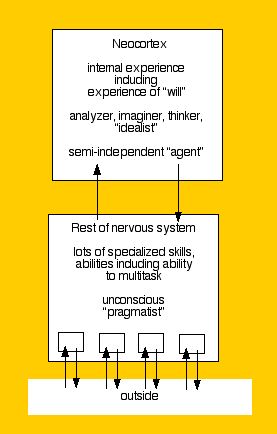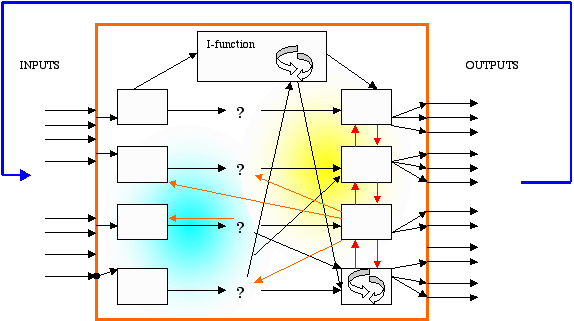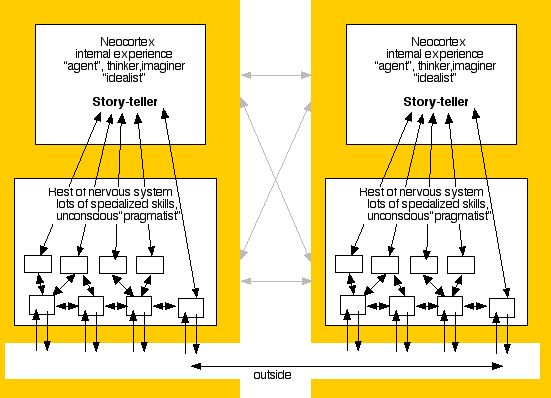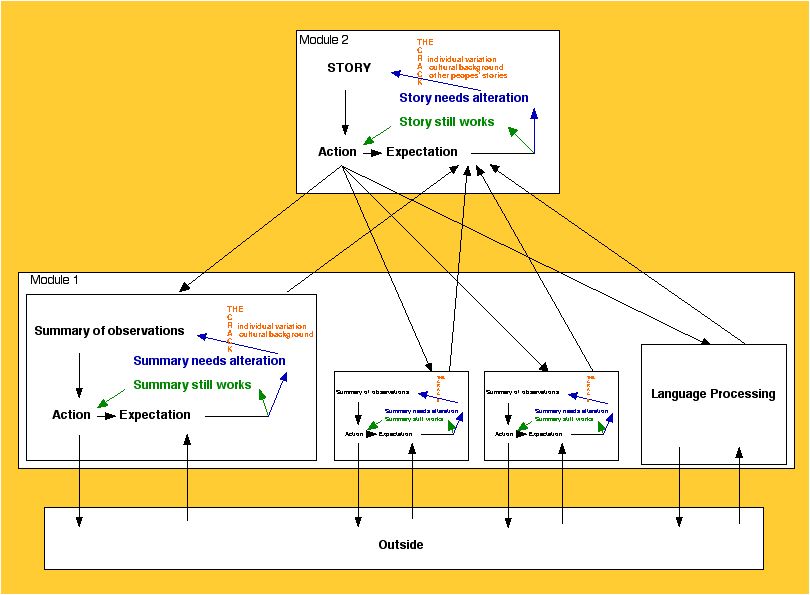Serendip is an independent site partnering with faculty at multiple colleges and universities around the world. Happy exploring!
Brain Behavior Institute - Session 17
 |
BRAIN AND BEHAVIOR INSTITUTE 2008 |

|
The Unconscious/I-function/Story Teller, Intuition/Rationality, Learning/Memory,
Human Differences: Their Origins and Significance
The Three Loops
Review:
"the Buddha never spoke of humans as persons existing in some fixed or static way. Instead, he described us as a collection of five changing processes: the processes of the physical body, of feelings, of perceptions, of responses, and of the flow of consciousness that experiences them all. Our sense of self arises whenever we grasp at or identify with these patterns. The process of identification, of selecting patterns to call "I," "me," "myself," is subtle and usually hidden from our awareness" ... Adi (quoting from A Path With Heart)
Some of my students have internal clocks that trigger at the wrong time for learning; how can we address this in a society that still believes that children learn at the same times during the day? ... Judith
At some point it would be nice if the "powers that be" would realize that children at different ages have different attention spans and different biological clock cycles ... Alan
educate the community on the concept of individuality and children's readiness for various activities ... Tola
In order to reach my charges, it is becoming more evident that I have to find a way to involve the "cognitive unconscious" as well as the "I-function." We have to break through to the "CU." Now I'm beginning to wonder if we really need the "I-f" at all. If we can instill the material in the CU, isn't that enough? ... Alan
I want to know how to think about feelings and emotions, in the framework we have been developing this week and last. What is it when I feel sad, happy, frightened, etc.? And where is it? I know I should be able to use my understanding of the cognitive unconscious, the I function and the storyteller to understand 'feelings', but I am having some trouble 'telling' this story ... Carol scientific story telling, reflective learning ... Paul
 Some more bipartite issues:
Some more bipartite issues:
- Feelings, intuitions, emotions as general signals from the unconscious
- Learning versus memory
- Self versus story of self
- Impacts of story on the unconscious


The Bipartite Brain as a Scientist/Explorer/Story Teller/Story Reviser
The value of inside conversations- Personal choice, free will
- I-function tells/retells story of self, as unconscious tells/retells story of world?
- Co-constructing reality and the self
- "I am, and I can think; therefore I can change who I am" (and things around me as well)
The value of conversations with others (adding the third interpersonal loop)

Human diversity as asset rather than problem
- Diversity and Deviance: A Biological Perspective
- Culture as Disability
- Neurotypical Syndrome
- A test case: sex/gender
Thinking about individuals and culture in terms of the brain

Science is not a particular set of understandings but instead is
a particular skill at generating new understandings,
a skill that is inherent in the brain,
one that everyone starts with and can get better at.
True? Good story? Add your thoughts in the on-line forum.




Comments
brain and behavior
Stress test
I found this stress test online - not sure if you can use it with your students or not, but I found it interesting....
Here is a very quick test to determine your stress level. Read the following description completely before looking at the picture.
The picture below was used in a case study on stress levels at St. Mary's Hospital. Look at both dolphins jumping out of the water. The dolphins are identical. A closely monitored, scientific study revealed that, in spite of the fact that the dolphins are identical, a person under stress would find differences between the two dolphins. The more differences a person finds between the dolphins, the more stress that person is experiencing.
Look at the photograph, and if you find more than one or two differences, you may want to take a vacation or at least get a massage.
Click here to see the pictureThe Need for Processing Time
This morning's session emphasized for me (once again) the need for time for our minds to process new information, organize it and re-organize it until it can be fit into our existing "spaces" . . . or until it can create new spaces (or boxes) or connections so that it can "be made sense of." My mind will be reading this morning's notes and the links on the page . . . and playing the games (of course) for a day or 2 (or more) to enable my mind to "get a handle on" what was presented. At this point I feel that digestion takes longer than it used to. Maybe my "hard drive" is closer to its capacity than it used to be. More than likely, tho, it's just that the old central processor doesn't function as rapidly as it used to. Maybe it never really did. Maybe the "once faster processing speed" is just a story I made up because it makes me feel better.
Maybe that statement shows that I am beginning to understand some of the material that was presented this morning.
Now where are the rest of those games . . . ???
Morning Session Feelings
Understanding the how, when, and why of emotions, mood and memory will take a life time to explore and understand. I think this is what learning is all about.
The spelling issue is not an issue for me because I must take extra care when writing or my writing will look like the example from the Cambridge paper. I think we have missed the point in this area. Spelling is important but we have computers with spell check to do that for us.
My thought about what we learned today is that I want to combine the three loops of observations together in order to engage my students in their own meaningful learning experience about what they have already learned! This I think is what teaching is all about!
Text messaging
This whole thing about reading by taking note of only the first and the last letters must have given birth to the idea of text messaging which is very common among students nowadays.
One thing I'm really worried about is the potential it has to ruin our students' ability to write properly. In my adult night school, students turn in essays to me in text messaging format!!! and they don't see anything wrong with it.
Even though it's fun to engage in this habit, there's need let the incoming generation be aware of the danger inherent in encouraging it without some limitations.
TM-ing
Loops and Feelings
I wonder about all that gets in the way of our accessing/utilizing what our cognitive unconscious knows. It's clear that there are many times that I function activity interferes with, rather than enhances, information coming from the unconscious. In a society like ours that very much values I function activity, I wonder how to 'celebrate' the unconscious, without striking fear into us all (including me) I guess the way is to continually talk about the need for both systems to be strong and healthy.
As for feelings, we've defined them as I function activity based upon input from the cognitive unconscious. I've heard people dismiss the value of discussing feelings, or rather, see feelings as getting in the way of real thinking. I've always known that feelings were important to pay attention to, that they were clues/cues to something important going on inside of us. I kind of like the idea of considering feelings as a 'primary story' because dismissing a primary story is dismissing an incredibly important source of information into the nervous system, and would seriously handicap our ability to think, i.e. our I function.
One more thought: Are there developmental differences in the I function? Given that we know (or think we know) that the frontal cortex of a teenager is not as fully developed as that of an adult, and given what we know about what the frontal cortex does, in terms of assesing consequences, delaying gratification, etc,, can we say that the I function of a teenager is not the same, or rather, does not have all the same abilities, or, does not have such developed abilities, as an adults I function?
I keep going back to this post and adding things!
Don't people usually refer to the amygdala as the emotion center/regulator in the brain? Isn't the amygdala in the unconscious part of our nervous system, i.e. not the I function part? How can feelings be conscious, then? Or is what is conscious our experience of our feelings, which would locate feelings in both the I function and the unconscious?
science
After this course I understand the points being made about scientific consciousness.Getting it less wrong is key.there is a way to integrate these experiences.This course has confirmed my faith even more and allowed me to grow and expand my horizons in brain functioning as it relates to the classroom and learning.
Splleeng iz stoopid
Re-Splleeng iz stoopid
I agerr wthi yuo thuogh soem studtens make it so hard to believe that it is really working without teaching spelling per se. Our school district took out spelling as a stand-out component of our literacy block. We are still allowed to have a five to ten-minute mini-lesson on spelling but not allowed to go deep in that direction.
There are two problems:
The very first thing I do is get parents over to my side by working to gain their approval and confidence from the very beginning. With that they will be receptive to the education bits I want to share with them about their child through the year. More professional development will help teachers and together we will achieve "getting it less wrong".
I couldnt help but read such large print
One thing Cambrigde University did not mention (at least based on what you've said) about the way people learn is that with enough experience reading, the brain is able to speed through a word and read only its first and last letters to then assume the appropriate letters that remain that would more than likely make up the appropriate word. This same process hold true for individuals who have mastered speed reading; their eyes dash through sentences and only read the beginning and ending words, giving the person enough information to fill in the rest of the sentence.
Just for kicks, here's a little message I got just last night:
did I like else somebody to this send, dummy a like this reading time sweet your took you since (now read it backwards)
Post new comment